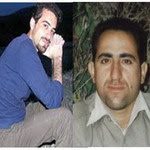
Amnesty is initiating a world-wide rapid action plan in order to save journalist Adnan Hassanpour who is sentenced to death.
A message will be published on our e-mail network, reaching more than 100,000 activists says Lisa Sivertsen from Amnesty International’s headquarters in London.
After BT (Bergens Tidende) yesterday mentioned the death sentence for Adnan Hassanpour, who has family in Fyllingsdalen and at Laksevåg, Sivertsen contacted Amnesty’s head quarter in London.
Not too late.
The researcher (Sivertsen) has had the death sentence confirmed by sources in Iran. "It is common practice in Iran that the death penalty is reaffirmed by the Supreme Court. We are campaigning for the reverse of the verdict", Sivertsen says.
Lately, Amnesty has noted an abundance of violations of human rights in Iran, and they fear that 25 year old Adnan has been tortured. During his time in prison he has been denied contact with his family.
"The situation is getting worse for all types of activities, whether by journalists, union members, women’s activists or others in opposition to the state authorities", says Sivertsen.
"International protests save lives", Eva Stabell, member of the International Union of Journalists points out.
"Through campaigns and actions we have prevented the executions of journalists. But that is only executions in public, we don’t know how many are in prison or are tortured", says Stabell.
Statoil has to pressure Iran
She thinks that the Norwegian Foreign Ministry, and Statoil and Hydro (Petrol companies) should pressure the Iranian authorities in order to stop the persecutions.
"Companies owned by the Norwegian state have to impose conditions such as freedom of expression when doing business with regimes such as Iran. I don’t know which conditions they have imposed on the corporation with Iran, but sometimes one might have to raise the threshold", Stabell says.
Since 2002 Statoil has been involved in a billion dollar project for the storage of gas in Iran.
Information director in Statoil Jone Stangeland says that the company are imposing strict conditions on the corporation with Iran.
"But in cases like this that are not connected to our company we think that they need to be discussed at diplomatic level by the Norwegian authorities", he says.
Why can Statoil not impose conditions on Iran?
Our view is that we have a limited engagement in Iran, and that the protection of fundamental human rights has to be discussed by the Norwegian authorities, says Stangeland.
Foreign Ministry concerned
The Norwegian Foreign Ministry will now investigate the case.
"Norway is concerned about the situation of human rights in Iran, where there is an increase in the use of the death penalty. This is a question that Norway should raise with Iran on a regular basis. In this specific case we have asked the Norwegian Embassy in Tehran to investigate the factual circumstances", says deputy director in the Foreign Ministry Bjørn S. Jahnsen.
"If it is the case that the journalist has been convicted because of his work as a journalist, we will raise the case with the Iranian authorities", says Jahnsen.
BT tried several times to get a comment from the Iranian an Embassy in Oslo, but had no luck.
This article originally appeared here in Norwegian (translated for this site by Khalid Khedri)


No comments:
Post a Comment